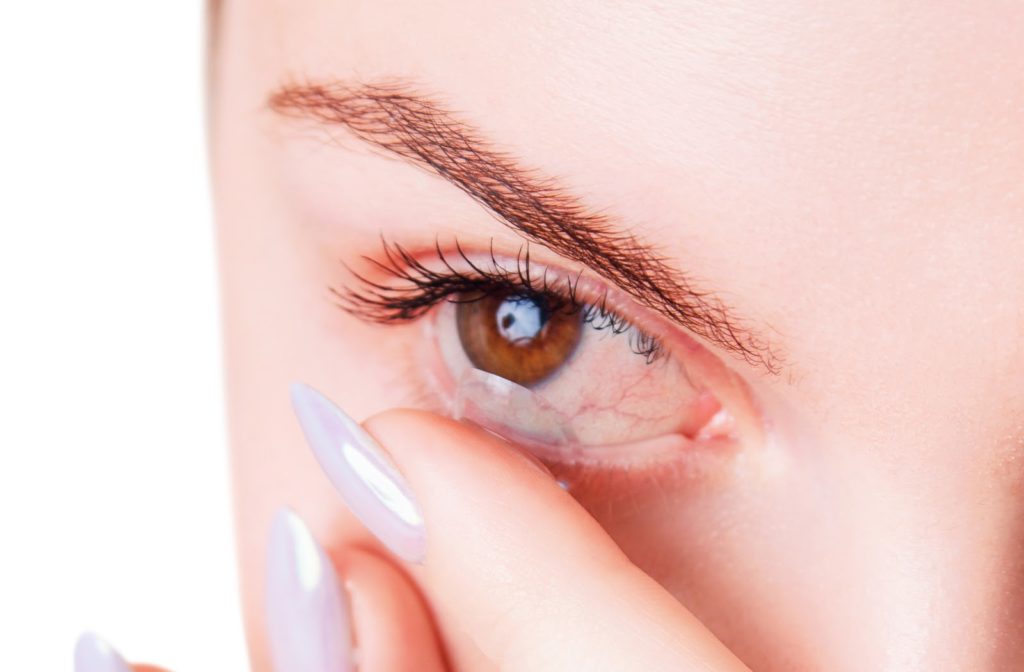The symptoms that come with dry eyes are difficult enough to handle by themselves, but that’s not the only challenge this irritating condition brings. Dry eyes can also restrict your ability to wear specific contact lenses comfortably.
If you have dry eyes, it’s vital to know what contact lens types and brands will serve you best. Read on as we explain the most important considerations for people with dry eyes who want to wear contact lenses, and learn how to choose appropriate lenses for your needs.

Dry Eyes 101: Causes & Symptoms
Dry eyes typically occur for one of two reasons: your eyes either stop being able to produce tears, or they create poor-quality tears that evaporate faster than usual. Poor-quality tears often result from a problem with your meibomian glands, which produce oil that maintains your tear film’s stability.
Potential Risk Factors For Dry Eyes
Many factors may increase a person’s risk of dry eyes or exacerbate their symptoms. These factors include:
- Age (dry eyes become more likely as you get older)
- Biological sex (people who are assigned-female-at-birth are more likely to experience dry eyes)
- Diet (Vitamin A deficiency and omega 3 deficiency are both risk factors)
- Exposure to radiation (often from radiation therapy)
- Complications from laser eye surgery
- Exposure to smoke
- Exposure to low-humidity environments
- Specific medications (including some SSRIs, antidepressants, steroids, and antihistamines)
Some studies also suggest that wearing contacts may be associated with dry eyes. However, specific types and brands of contact lenses exist for people with dry eyes that are less prone to causing symptoms.
Symptoms of Dry Eyes
People with dry eyes may experience any of the following symptoms:
- Persistent dryness
- Itchiness in the eye area
- Burning sensations in or near the eyes
- Redness of the eyes or surrounding skin
- Pain in the eyes (often described as “gritty”)
- Ocular fatigue, even when well-rested
Dry eyes can make many everyday visual tasks more difficult, including reading, driving, and working at a computer. It is vital for people who wear contact lenses to choose products that will not increase their risk of developing dry eyes or make current symptoms worse.
How Can Dry Eyes Affect Your Ability to Wear Contacts?
Research into the link between contact lenses and dry eyes remains ongoing, but one study suggests that the materials used in some contacts may play a significant role. Specifically, wearing contact lenses with high water content increased the probability of developing dry eyes.
You might expect lenses with high water content to provide extra moisture and reduce symptoms associated with dry eyes, so why do these lenses seem to do the opposite? The same study suggests that the lenses’ water attracts lipids and proteins from the eye, further compromising the tear film’s stability and potentially dehydrating the lens itself.
However, avoiding contact lenses with high water contact isn’t all you can do to discourage dry eyes. Choosing lenses with specific ingredients may even help you reduce or eliminate symptoms.
What Lenses (and Brands) are Best For Dry Eyes?
Below is our list of recommended contact lenses for people with dry eyes. We’ve categorized these lenses by type, with suggestions for particular brands and products within each section.

Daily Lenses
In general, daily lenses tend to be better for dry eye. Wearing a new pair of contacts every day prevents build-up and the discomfort that comes with it.
Another advantage is you don’t have to worry about contact lens storage, as you wear a fresh pair every day.
Alcon Dailies Total 1 are water-gradient, one-day contact lenses that help combat dryness while providing you with clear vision.
Soft Lenses
Soft contact lenses are made of soft, flexible plastic. This material allows oxygen to pass through the contact lens to the cornea, creating a more comfortable feeling.
Bausch & Lomb ULTRA contact lenses are a soft contact lens that help provide comfort all day long. These lenses are made with MoistureSeal technology, which helps maintain moisture and prevent dryness for up to 16 hours.
Silicone Hydrogel Lenses
Silicone hydrogel is an absorbent plastic material used to make numerous soft contact lenses. Research suggests that silicone hydrogel contact lenses may cause fewer symptoms associated with dry eyes than standard hydrogel lenses (which have higher water content).
Silicone hydrogel lenses help keep your eyes feeling moisturized by:
- Transmitting more oxygen
- Absorbing more water
ACUVUE produces numerous silicone hydrogel lenses suitable for people with mild to moderate dry eyes. The ACUVUE OASYS 1 Day with Hydraluxe™ technology has an internal wetting agent that may improve optical quality during wear.
Hybrid Lenses
Hybrid contact lenses combine the visual benefits of rigid gas-permeable lenses with the comfort of soft contact lenses. The centre of the contact lens is made of rigid gas-permeable material, while the outer ring is made of a soft lens material.
SynergEyes Specialty Hybrid are one type of hybrid contact lens. These hybrid lenses give the best of both worlds, helping to provide both comfort and crisp vision, particularly for those with astigmatism or irregular eye shapes.
Scleral Lenses
Scleral lenses are one type of rigid gas-permeable (RGP) lenses, which differ from soft contacts by remaining rigid during wear. However, while standard RGP lenses are worn on the cornea like soft contacts, scleral lenses are worn on the sclera instead (the white part of the eye).
Because scleral lenses sit above the cornea, they create space beneath for saline solution to occupy. This reservoir hydrates the eye and has been shown to reduce symptoms associated with dry eyes.
Ask Your Optometrist About Contact Lenses For Dry Eyes
Every pair of eyes is different—otherwise, we wouldn’t have so many options for contact lenses available on the market! However, people at risk for dry eyes (and those who already have them) need to be a little more careful than others when choosing appropriate contact lenses.
Silicone hydrogel lenses and scleral lenses are often excellent choices, but always consult your eye doctor before committing to new contacts. We’ll use our expert medical knowledge to help you select ideal lenses for your eyes.

